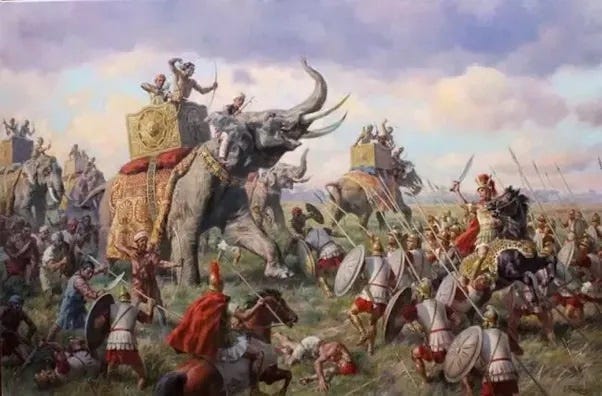

His rival, Ambhiraj, king of Takshashila, befriends Alexander to take revenge from Porus and his family. Porus married his love interest Lachi, and at the same time, got to know about Alexander's entry into India. On the other hand, the serial shows how Alexander yearned to become one of the greatest conquerors of the world. Porus exposed Darius III in front of everyone, who had actually come to take control of Punjab to gain huge profits by trade. Porus grows up as a tribal, but finally realises what he actually is - The true successor of the throne of Paurava (Punjab). They show that they were destined to meet. This file has an extracted image: File:Porus's elephant cavalry, Cosmographia (1544).jpg.The drama focuses on the story of Porus and Alexander. The leaf contains one excellent woodcut picture (3" x 4") of a military unit consisting of an elephant carrying a group of soldiers." Alexander even subdued an independent province and granted it to Porus as a gift. Alexander captured Porus and, like the other local rulers he had defeated, allowed him to continue to govern his territory. The Macedonian phalanx then routed the enemy.

During the battle, Alexander overwhelmed Porus' left wing, forcing it back upon the elephants, which panicked and plunged riderless into the Indian ranks. More troublesome to Alexander than the numerical superiority of Porus' 34,000-man army were the 200 elephants that threatened the effectiveness of the Macedonian cavalry.

After facing the Indians for days across an unfordable river, Alexander, by using diversionary tactics, managed to cross the stream above their camp. It describes the greatest of Alexander's battles in India against Porus, one of the most powerful Indian leaders - the rajah of the lands between the Jhelum and the Chenab rivers in the Punjab. This leaf from the early French edition of Cosmographia is devoted conquest of India by Alexander the Great. French edition Basel printing house of Sebastian Heinrich-Petri 1552. "Woodcut leaf from "Cosmographia" (1544) by Sebastian Münster.

English: Porus’s elephant cavalry, according to Munster’s famous Cosmographia (1544)


 0 kommentar(er)
0 kommentar(er)
